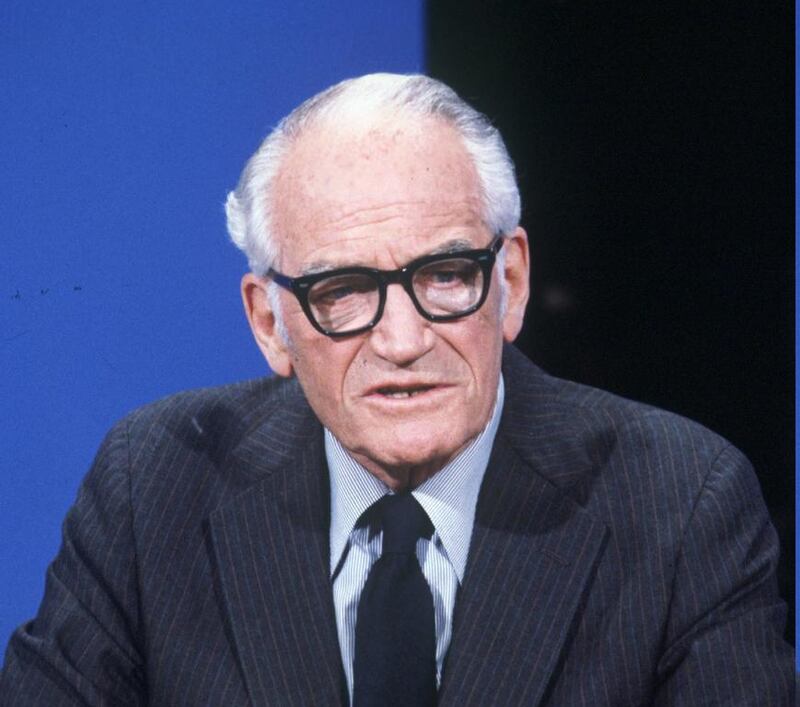Bill Bogert is a character actor in America. He is not especially well known, even though he has had guest appearances on a raft of popular TV shows over the years including Hill Street Blues, Taxi, Knots Landing and Hart to Hart.
Inasmuch as an 80-year old can be a posterboy, Bogert has become the posterboy of Hillary Clinton’s 2016 campaign as the Democrats try to warn voters of the apocalypse they believe a Trump presidency would bring to the United States.
In 1964 Bogert appeared in a television advert “Confessions of a Republican”, urging people to vote for Lyndon Johnson rather than Barry Goldwater who “scared” him. Now more than five decades later he has remade the ad on behalf of Hillary Clinton, giving a very similar message about Donald Trump.
Many months ago Mr Trump boasted that he could shoot somebody on Fifth Avenue and people would still vote for him.
Many a true word is spoken in jest. Time after time his poll numbers have plummeted for a few days after an indiscretion, before bouncing back. He has alienated women with crude attacks on everyone from Megyn Kelly to Alicia Machado, a former Miss Universe. The Latino vote is pretty much a write off and Mr Trump is lagging far behind Mrs Clinton among those who have a college education.
He provoked outrage with his attack on John McCain, who spent more than five years as a Vietnamese prisoner of war. Many people were appalled by his clash with Khizr and Ghazala Khan, whose son was killed serving the United States in Iraq. But somehow, despite gaffe after gaffe – including the obscene comments he made during a 2005 interview, the tapes of which were only released this weekend – his campaign survives and few would completely write off his chances of winning the keys to the Oval Office in November.
Until now, Mr Trump has shown little sign of haemorrhaging support from angry blue-collar workers whose living standards have plummeted over the past couple of decades.
This cohort of voters is pivotal especially in the swing industrial states such as Pennsylvania, which could dictate the result next month. Perhaps some might think again following the disclosure about Mr Trump’s financial arrangements, suggesting he could have used massive corporate losses in the mid-1990s to avoid paying federal taxes.
For taxpaying voters who might have to hold down two jobs just to make ends meet, this could prove a hard pill to swallow. But many appear to have accepted the spin put out by Team Trump that this is merely another demonstration of his financial acumen, which the United States needs in the White House. This is where Bogert comes in as he reprises the 1964 advert 52 years later.
“Trump says we need unpredictability when it comes to using nuclear weapons. What is that supposed to mean?” Bogert asks in the 2016 slot. Democrat strategists have noticed uncanny parallels between the two campaigns. They are hoping for a similar result.
In 1964, Republicans candidate senator Barry Goldwater was humiliated, losing by one of the biggest landslides in US history. Arguably, Mr Trump is the most extreme candidate since Goldwater and their approaches to foreign policy and dealing with America’s foes are rather similar.
In 1964, Goldwater’s running mate Curtis LeMay wanted to bomb the north Vietnamese – in his own words “back to the stone age”. Mr Trump’s strategy is to “bomb the hell” out of ISIL’s oilfields. He also does not seem to be particularly concerned about the number of civilians who would be killed as a result.
The Democrats’ response in 1964 was to warn voters that a Goldwater presidency would increase the risk of nuclear war, with what many regard as some of the most powerful attack ads in political history. One morphed from a young girl plucking a daisy to a nuclear countdown. Another showed a girl eating an ice cream as the voice-over describes what would happen if the bomb dropped. Team Clinton is doing much the same this time round with one advert warning “all it takes is one wrong move”.
Mr Trump’s praise for Kim Jong-un, Vladimir Putin and Saddam Hussein have been used to suggest that they could be role models for his presidency. His economic policy would, voters are being told, plunge America into a recession. Mr Trump is shrewd enough to know he is asking voters to take a massive gamble in choosing him for the presidency. He pretty much admitted this with his “What do you have to lose?” pitch to black voters.
The Democrats’ answer to this is everything. As the campaign enters its final stretch, one would not be surprised to see them reissue one of their better 1964 campaign badges which read: “In your guts, you know he’s nuts.”
David Millward is a journalist in the United States





